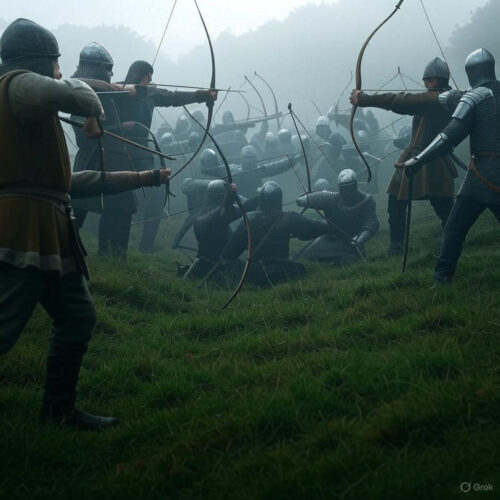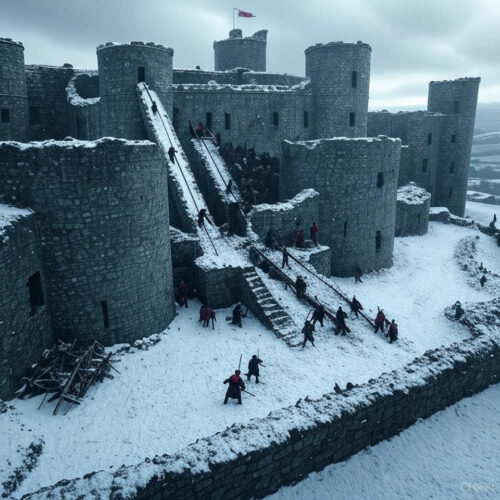Imagine a crisp autumn morning in the rolling hills of northeast Wales, where the air carries the scent of damp earth and distant heather. It’s September 16, 1400, and in the shadow of the Berwyn Mountains, a man of noble lineage stands before a gathering of kin, allies, and loyal followers. This is no ordinary assembly; it’s the birth of a rebellion that would shake the foundations of English rule in Wales for over a decade. That man is Owain Glyndŵr, a figure whose name still evokes the spirit of resistance in Welsh hearts. On this day, he proclaimed himself Prince of Wales, igniting the Glyndŵr Rising—the last great Welsh war of independence. As we mark this date in 2025, over six centuries later, let’s dive deep into the rich tapestry of this event, exploring its historical depths, the dramatic twists of fate, and the enduring lessons it holds for personal empowerment today. This isn’t just history; it’s a thrilling tale of courage, strategy, and unyielding will that reads like an epic adventure.
To truly appreciate the magnitude of Owain’s proclamation, we must first step back into the medieval world of late 14th-century Wales. By 1400, Wales had been under English domination for over a century, ever since Edward I’s brutal conquest in the 1280s. Edward, known as the “Hammer of the Welsh,” had crushed the principality of Llywelyn ap Gruffudd in 1282, executing him and imposing a harsh feudal system. Castles like Caernarfon and Conwy dotted the landscape as symbols of English control, manned by sheriffs and lords who treated the Welsh as second-class subjects. Penal laws stripped Welshmen of rights: they couldn’t own land in certain areas, hold office, or even bear arms without permission. English was the language of law and administration, while Welsh culture simmered beneath the surface, preserved in bardic poetry and ancient prophecies.
Owain Glyndŵr himself was a product of this Anglo-Welsh border world. Born around 1354 (some sources suggest 1359) at Sycharth, a modest manor house in the lordship of Glyndyfrdwy, Owain came from a lineage steeped in Welsh royalty. His father, Gruffudd Fychan II, traced descent from the princes of Powys Fadog, and through his mother, Elinor, from the royal houses of Deheubarth and Gwynedd—the very bloodlines of Llywelyn the Great and Llywelyn the Last. This heritage wasn’t just genealogy; it was a claim to legitimacy in a land hungry for a native leader. Owain’s upbringing blended Welsh tradition with English influence. He spoke both languages fluently, was educated in law at both the Inns of Court in London and possibly the University of Poitiers in France, and even served in the English military.
Picture young Owain, in his twenties, riding to war under the banner of his cousin, Roger Mortimer, Earl of March. In 1385, he fought in Scotland against the Scots, and in 1387-88, he joined the English campaigns in Lithuania against the Teutonic Knights. These experiences honed his skills as a warrior and diplomat. He married Margaret Hanmer, daughter of Sir David Hanmer, a prominent English judge, further entangling him in the Anglo-Welsh elite. By the 1390s, Owain had settled into life as a country gentleman, managing estates in Glyndyfrdwy and Sycharth. Sycharth was no grand castle but a fortified hall house with a moat, lake, and deer park—a place of hospitality where bards sang of ancient heroes. Owain himself was known as a patron of poets, hosting figures like Iolo Goch, who praised his hospitality and prophesied his rise.
But paradise was fragile. The late 1390s brought turmoil to England. Richard II, the child-king who had grown into a capricious tyrant, was deposed in 1399 by his cousin Henry Bolingbroke, who became Henry IV. This Lancastrian usurpation destabilized the realm, and in Wales, it fueled resentment. Welshmen saw parallels to their own lost princes, and prophecies of a deliverer—”Y Mab Darogan,” the Son of Prophecy—circulated widely. Owain, with his royal blood, fit the mold perfectly. Yet, his rebellion wasn’t born of abstract ideology; it was sparked by a very personal grievance.
Enter Lord Reginald Grey of Ruthin, an English baron whose lands bordered Owain’s. Grey was a hot-headed noble, favored by the new king Henry IV. In the summer of 1400, Grey seized a herd of Owain’s cattle that had strayed onto his land, claiming it as distraint for an unpaid debt that Owain disputed. More insultingly, Grey was appointed Justice of the Peace for North Wales and failed to notify Owain of a royal summons to muster troops against the Scots. When Owain didn’t appear, Henry IV’s council accused him of treason. Owain, feeling cornered and humiliated, turned to his Welsh kin. By early September, whispers of uprising spread. On September 16, 1400, at his manor in Glyndyfrdwy—possibly in the great hall or under the open sky—Owain gathered about 300 men: his immediate family, in-laws like the Hanmers, local Welsh gentry from the Berwyn region, friends from northeast Wales, the Dean of St. Asaph (a symbolic clerical endorsement), and armed supporters. In a ceremony echoing ancient Welsh inaugurations, they proclaimed him Prince of Wales, complete with traditional rites. Bards likely recited prophecies, and oaths were sworn. It was a declaration of independence, not just personal, but national.
The proclamation was no empty gesture; it unleashed a torrent of action. Within days, Owain’s forces struck. On September 18, they raided Ruthin, burning the town and Grey’s castle. The flames spread metaphorically: by late September, Denbigh, Rhuddlan, Flint, Holt, Oswestry, and Welshpool were ablaze. English chronicles, like those of Adam of Usk, describe the panic in Chester, where refugees fled and markets shut. Henry IV, preoccupied with Scottish threats and domestic plots, initially dismissed the revolt as a minor uprising. He sent a small force under the Earl of Arundel, but it was routed near Welshpool on October 19, 1400. Owain’s tactics were brilliant—guerrilla warfare suited the rugged Welsh terrain. He avoided pitched battles early on, using hit-and-run raids to disrupt supply lines and morale.
As 1401 dawned, the rebellion gained momentum. Owain’s cousins, Gwilym and Rhys ap Tudur, captured Conwy Castle on Good Friday, April 1, 1401, in a daring coup. Dressed as pilgrims, they scaled the walls and overpowered the garrison. This victory sent shockwaves; Conwy was a key English stronghold. In June 1401, at the Battle of Mynydd Hyddgen in Pembrokeshire, Owain’s 120 men defeated a much larger English force of 500, led by Mortimer. It was a David-and-Goliath moment, boosting recruitment. By now, the revolt had spread to south Wales, where figures like Dafydd Gam joined, though some Welsh lords remained loyal to England.
Henry IV responded with fury. In 1402, he led three major expeditions into Wales, scorching the earth and executing rebels. But Owain eluded him. On July 22, 1402, at the Battle of Bryn Glas (Pilleth), Owain ambushed an English army under Sir Edmund Mortimer (cousin of the Earl of March). The Welsh archers and spearmen decimated the foe; Mortimer was captured. This was pivotal: Mortimer, imprisoned and denied ransom by Henry IV, allied with Owain. He married Owain’s daughter Catrin in 1402, cementing the bond. Mortimer’s claim to the English throne (as heir to Richard II) added a layer of intrigue—Owain now backed a rival to Henry.
The year 1403 brought alliances abroad. Owain sent envoys to France and Scotland, seeking aid against their common enemy. Charles VI of France, locked in the Hundred Years’ War, saw opportunity. In 1404, French ships arrived with troops, helping Owain capture Harlech Castle after a siege. By summer 1404, Owain controlled most of Wales. On September 16—exactly four years after his proclamation—he held a formal parliament at Machynlleth, where he was again acclaimed Prince of Wales. Another assembly at Harlech outlined his vision: an independent Wales with its own parliament, two national universities (one in the north, one in the south), reinstatement of the laws of Hywel Dda (the 10th-century Welsh legal code), and a separate Welsh church free from Canterbury’s yoke. Bards composed triumphant poetry; Gruffudd Llwyd wrote of Owain as the prophesied savior.
Peak of power came in 1405 with the Tripartite Indenture, a secret treaty with Mortimer and Henry Percy (Hotspur), the rebellious English earl. Signed around February 1405, it proposed partitioning England and Wales: Owain to rule all Wales and the western marches, Mortimer the midlands, Percy the north. Though Percy was defeated at Shrewsbury on July 21, 1405, the alliance highlighted Owain’s strategic acumen. French aid peaked too; in 1405-1406, 12,000 troops under the Duke of Clarence landed, but coordination faltered, and they withdrew after minor successes.
Yet, hubris and logistics turned the tide. Owain’s forces overextended, and English counteroffensives intensified under Prince Hal (future Henry V). In 1407, Aberystwyth Castle fell after a prolonged siege. Harlech, Owain’s symbolic capital, held until 1409, but starvation forced surrender. Tragically, Owain’s family suffered: his wife Margaret, daughters Catrin, Alys, and Jane, and grandsons were captured and imprisoned in the Tower of London. Catrin died in 1413, possibly by suicide. Owain himself vanished into the hills, waging guerrilla war until 1412. English records note a £100 reward (equivalent to millions today) for his head, but he was never taken. Adam of Usk recorded his death on September 20, 1415, at 81, but no body was found. Legends persist: buried at Monnington-on-Wye? Or Kentchurch? His grave remains a mystery, fueling myths.
The rebellion’s end was bittersweet. Wales returned to English fold, but at great cost—thousands dead, lands devastated. Penal laws tightened until Henry VII’s accession in 1485, himself of Welsh descent. Yet, Owain’s legacy endures. He’s Y Mab Darogan, symbol of Welsh nationalism. The 15th-century poet Guto’r Glyn called him “the head dragon.” Today, Owain Glyndŵr Day is celebrated on September 16 with parades in Machynlleth. Statues stand in Cardiff and Corwen; his banner, the red dragon, flies on Welsh flags. The rising preserved Welsh language and culture, influencing later movements like the 19th-century eisteddfodau and 20th-century devolution. Historians like Rees Davies in “The Age of Conquest” argue it delayed full assimilation, keeping Welsh identity alive.
Delving deeper, let’s examine the military innovations. Owain’s use of terrain was masterful—the mountains of Snowdonia and Cambrian ranges provided natural fortresses. He employed longbowmen, inherited from Edwardian wars, but adapted for ambushes. Logistics were key: supporters supplied food via a network of uchelwyr (gentry). Diplomatically, Owain’s letters to Charles VI, preserved in French archives, show eloquent pleas for solidarity against “the tyrant Henry.” One 1404 missive promises mutual aid in the Hundred Years’ War.
Socially, the revolt united disparate Welsh factions. Bards like Siôn Cent galvanized support with cywyddau (poems) decrying English oppression. Women played roles too; Owain’s daughters hosted at Harlech, and local women smuggled supplies. Economically, raids disrupted English trade; wool from Welsh marches, vital to England’s economy, halted.
Comparatively, the Glyndŵr Rising parallels other medieval revolts: like William Wallace’s in Scotland (1297-1305), it used prophecy and guerrilla tactics, but unlike Wallace’s defeat at Falkirk, Owain’s longevity stemmed from better alliances. It differed from the Peasants’ Revolt of 1381 in England, which was class-based; this was nationalistic. Chroniclers like the Brut y Tywysogion (Chronicle of the Princes) portray Owain heroically, while English sources like the Rolls of Parliament vilify him as a traitor.
Archaeologically, sites like Sycharth—excavated in the 1980s—reveal a prosperous hall burned in 1403 by English forces. Artifacts include pottery and weapons, attesting to its role. Harlech’s siege is depicted in Froissart’s Chronicles, though romanticized.
Now, over 625 years later, what does this distant echo mean for you? Owain’s story isn’t dusty history; it’s a blueprint for personal sovereignty in a world of modern “occupations”—be it corporate hierarchies, societal expectations, or self-doubt. The outcome of his rising? Though it didn’t achieve full independence, it proved one person’s stand can inspire generations, preserve identity, and force oppressors to reckon with resistance. Today, apply this by reclaiming your own “principality”—your autonomy, voice, and purpose. Here’s how, with specific, actionable insights drawn from Owain’s defiance:
– **Assess Your ‘Border Disputes’ Like Owain Did with Lord Grey:** Identify personal grievances—perhaps a toxic boss encroaching on your work-life balance or a relationship draining your energy. Document them meticulously, as Owain gathered evidence of his land seizure. Benefit: This builds a case for change, preventing escalation into resentment. In your life, start a private journal today, listing three such issues with facts, not emotions, to empower informed action.
– **Gather Your ‘Council’ for Proclamation:** Owain didn’t go alone; he rallied 300 supporters. Surround yourself with a trusted circle—friends, mentors, or online communities—who affirm your worth. Benefit: Collective validation boosts confidence, mirroring how Owain’s assembly legitimized his claim. Apply it by scheduling a weekly call with one ally to voice ambitions, turning isolation into a support network that propels career shifts or habit changes.
– **Employ Guerrilla Tactics in Daily Battles:** Owain’s hit-and-run raids avoided direct confrontation. In modern terms, tackle overwhelming goals incrementally—e.g., if pursuing a side hustle, dedicate 15 minutes daily instead of all-or-nothing efforts. Benefit: Sustainable progress prevents burnout, much like Owain’s evasion prolonged his fight. Track wins in a app like Habitica, celebrating small victories to build momentum toward financial independence or skill mastery.
– **Forge Alliances Beyond Borders:** Owain sought French and Scottish aid; you can network across industries or cultures. Join LinkedIn groups or attend virtual meetups unrelated to your field for fresh perspectives. Benefit: Diverse input sparks innovation, as Owain’s Tripartite Indenture expanded his vision. Use this to pivot careers—e.g., a teacher allying with tech pros to create educational apps, opening revenue streams.
– **Envision Your ‘Parliament’ of Dreams:** At Machynlleth, Owain outlined universities and laws. Draft your personal manifesto: What does your ideal life look like in five years? Benefit: Clarity directs energy, preventing aimless drift. Review it quarterly, adjusting like Owain’s evolving strategies, to achieve milestones like home ownership or creative fulfillment.
– **Persist Through Sieges with Grace:** Owain’s family endured captivity, yet he fought on. When facing setbacks—like job loss or health issues—focus on inner resilience via meditation or therapy. Benefit: Unbreakable spirit turns adversity into legend, fostering emotional intelligence that enhances relationships and leadership.
– **Leave a Legacy of Inspiration:** Owain’s unknown grave symbolizes enduring mystery; your actions ripple too. Mentor others or blog about your journey. Benefit: Giving back amplifies personal growth, creating a “bardic” record that motivates your circle, much like Welsh poetry keeps Owain alive.
To operationalize this, here’s a 30-day plan inspired by Owain’s arc:
- **Days 1-7: The Spark (Assessment):** Journal your “border disputes.” Research one skill (e.g., public speaking) via free online courses. End the week by proclaiming a goal aloud to a mirror—channel Owain’s boldness.
- **Days 8-14: The Gathering (Allies):** Contact three potential supporters. Share your goal vulnerably. Organize a small “council” meeting, virtual or in-person, to brainstorm support.
- **Days 15-21: The Raids (Action):** Launch three guerrilla tasks—short, targeted steps toward your goal. Track progress daily. If resistance arises, evade by pivoting tactics, like Owain’s ambushes.
- **Days 22-28: The Parliament (Visioning):** Write your manifesto. Visualize it through mind-mapping. Seek one external alliance, like emailing a potential collaborator.
- **Days 29-30: The Legacy (Reflection):** Review achievements. Share one lesson with someone. Plan the next “rising”—scale your efforts for the long haul.
This plan isn’t abstract; it’s your personal Glyndŵr Rising, turning historical fire into modern fuel. Owain showed that even against empires, one voice can echo eternally. What will yours proclaim today?

